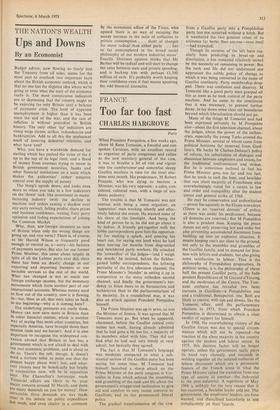THE NATION'S WEALTH
Ups and Downs
By an Economist
Budget advice, now flowing so freely into the Treasury from all sides, seems for the most part to overlook two important facts about the British economic outlook, which is that no one has the slightest idea where we're going or even what the state of the economy really is. The most conspicuous indicators are so depressing that the country ought to be enjoying (as only Britain can) a balance of payments crisis. The level of apparent unemployment is higher than it has been since the end of the war, and the rate of inflation is without precedent in British history. The only other 'up' indicators are rising wage claims, strikes, redundancies and bankruptcies. Add to all this the unpleasant smell of festering industrial relations, and what have you?
Why, you have a worldwide demand for sterling which has pushed the value of the £ up to the top of its legal limit, and a flood of money from overseas trying to invest in British government securities, banks and other financial institutions on a scale which shakes the authorities' rather tentative control over the supply of money.
The thing's upside down, and looks even more so when you take in a few indicators on the 'down' tack, like investment in manu- facturing industry (with the decline in machine tool orders casting a shadow over any early revival), falling profits, share prices and business confidence, waning Tory party optimism and fading expectations of joining the Common Market.
Why, then, are. foreign investors so sure of Britain when only the wrong things are going up, and vice versa? There is, of course, as Mr Harold Wilson is frequently good enough to remind us, a—sorry—his balance of payments surplus. But alas for our former Prime Minister, this came about largely in Spite of all the Labour party ever did, since there has been no drastic change in our exporting and importing business or our invisible services to the rest of the world. What has changed is not so much our foreign exchange income, but the monetary movements which form another part of our international accounts. Whereas money used to flow out of the country, now it is flowing in—but, bless us all, that only takes us back to the beginning—why is it coming here?
The underlying pressures are really these. Money can now earn more in Britain than In other financial centres, which is another way of saying that most other countries, but especially America, have brought down their Interest rates and we haven't. And it is also Important to recognise the widespread con- viction abroad that Britain at last has a government which is not afraid to deal with our real economic problems, and is about to do so. There's the rub, though. It doesn't need a fortune teller to point out that the present happy phase won't last, and what- ever planets may be beneficially but briefly In conjunction now, will be in opposition later. The Chancellor's horoscope reads Financial affairs are likely to be your major concern around 30 March, and there are many demands on you for money'. How Intractable these demands are was made Clear in the debate on public expenditure laSt week, and even clearer in a comment by the economics editor of the Times, who opined 'there is no way of escaping the steady increase in the ratio of collective to private consumption . . . short of changes far more radical than either party . . . has so far contemplated in the broad social philosophy of our modern industrial states'. Exactly. Overseas opinion thinks that Mr Barber will be radical and will start to change the ratio between state and private spending, and is backing him with perhaps £1,500 million of cash. It's probably worth keeping their confidence even if that means upsetting the odd financial journalist.


































 Previous page
Previous page